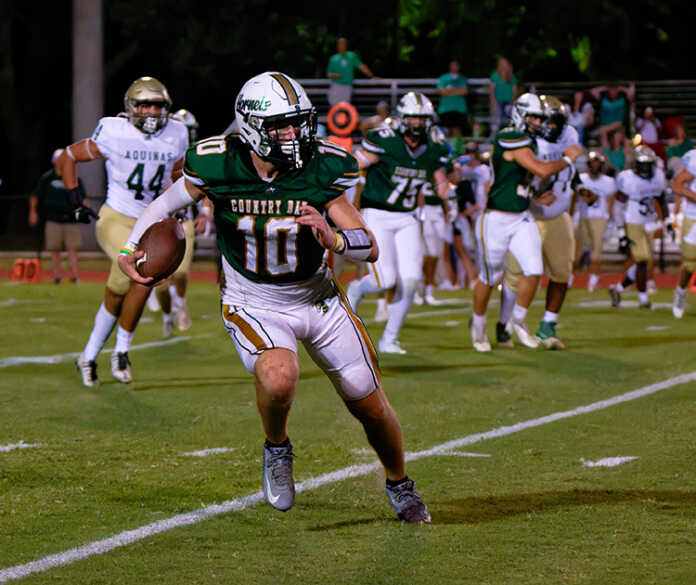
When John Mohring took over as head football coach at Savannah Country Day in 2021, the school was a GHSA Class A Private program. Mohring was aware that the Hornets had enjoyed some success at the A level, and he expected to build on that momentum.
“I was looking forward to coming into a small school environment, taking over a Class A independent school with a small roster of players, and building some stability and consistency,” Mohring said.
The Hornets had achieved 10-win seasons in 2017 and 2019. However, they had also gone through four head coaches in the four seasons prior to Mohring’s arrival, and that was why the new head coach knew stability was the first thing he needed to establish.
Savannah Country Day had finished 3-7 in 2020. Mohring showed modest improvement in his first season, leading the team to one more win with a 4-7 record.
“We had a really good team that first year, but some injuries to a couple of key players kept us from realizing their full potential,” he said.
Still, Savannah Country Day won a playoff game against Stratford Academy, a football team it had lost to in the regular season, so there was objective improvement Mohring could point to.
“Our record showed us at 4-7, but we felt pretty good about where we were headed,” said Mohring.
Then came the news that the Class A program Mohring had taken over was about to change. The GHSA introduced a “multiplier,” which would essentially count any out-of-zone student attending a private school as three students. The new policy was an attempt to mitigate any advantage that private (and some public) schools might have from drawing a higher percentage of their overall enrollment from outside the primary school zone.
Mohring’s world had just changed. Bigtime.
“We have roughly 370 kids in our upper school [grades 9-12], and half of those students are girls,” Mohring said. “So when the multiplier hit, it really affected us.”
Throw in the fact that Savannah Country Day is a high academic school, and suddenly the overall number of available students interested in playing football was reduced even more.
Now, with the multiplier in effect, Savannah Country Day would move from Class A Private to Class 3A, which would mean playing opposing schools with much higher overall enrollments.
Savannah Country Day wouldn’t be the only school affected. Dozens of smaller GHSA private and public schools would be affected. Still, Mohring’s responsibility was his Hornets football team, and now his goals of building a consistent and winning program would be that much tougher.
But in his second season overall, and first as head coach in a classification with teams whose overall enrollment were double and triple that of his own, Mohring was able to keep Savannah Country on that path to consistency.
The Hornets improved to 5-5 as a member of Region 3-3A in 2022, just missing the playoffs – with a 3-4 region record, they were one win away from the No. 4 seed.
In 2023, Savannah Country Day enjoyed its best finish under Mohring, going 7-3 in the regular season and securing the No. 3 seed in region play, marking the school’s first playoff appearance as a member of Class 3A.
Savannah Country Day’s first-round opponent was Upson-Lee, a team with a roster twice as large as the Hornets. Mohring said his team went into the game as a 28-point underdog.
“We took a playing roster of around 30 players against their larger roster,” he said.
Still, Mohring’s team played like it belonged and looked as if it would pull an upset. The Hornets took a lead into halftime and was ahead 45-30 with around 8 minutes left in the game. But the lack of depth ultimately took its toll, and the Hornets couldn’t maintain the two-touchdown advantage. They lost a heartbreaker, 46-45.
Despite the loss, Mohring saw what his Savannah Country Day football team was capable of in that game – and what it means moving forward into next season.
“I can’t even really be mad,” he said. “The multiplier has a big impact on us, plus we are a high academic school, but we have showed that we can compete.”






